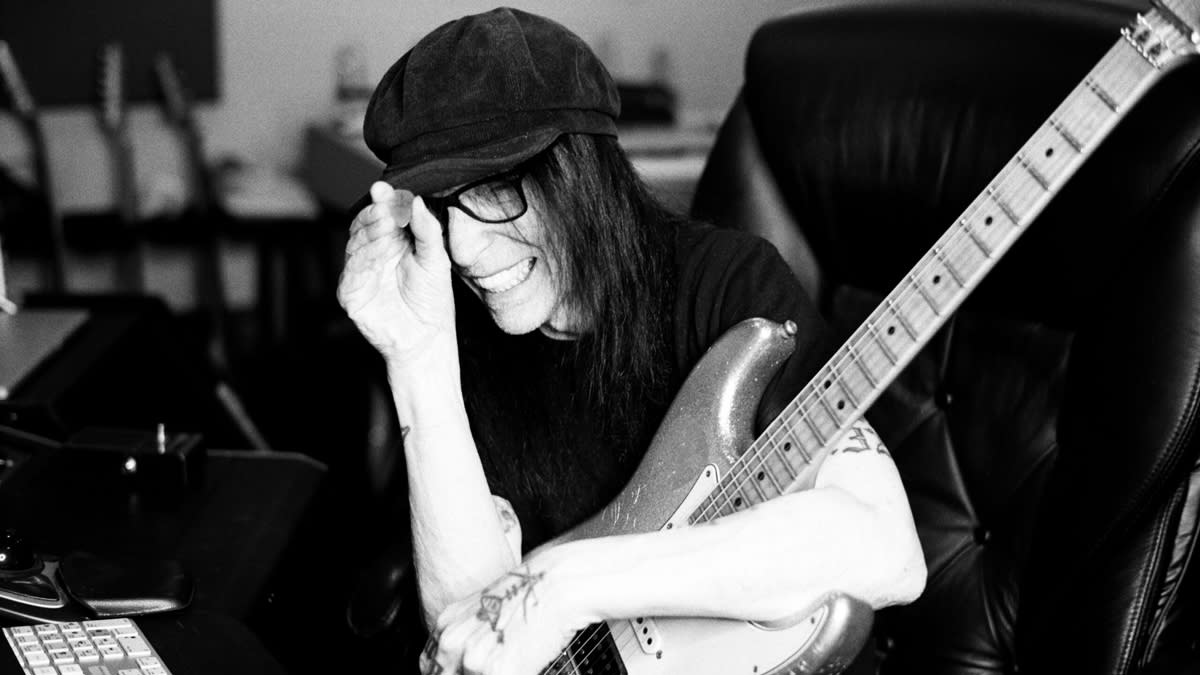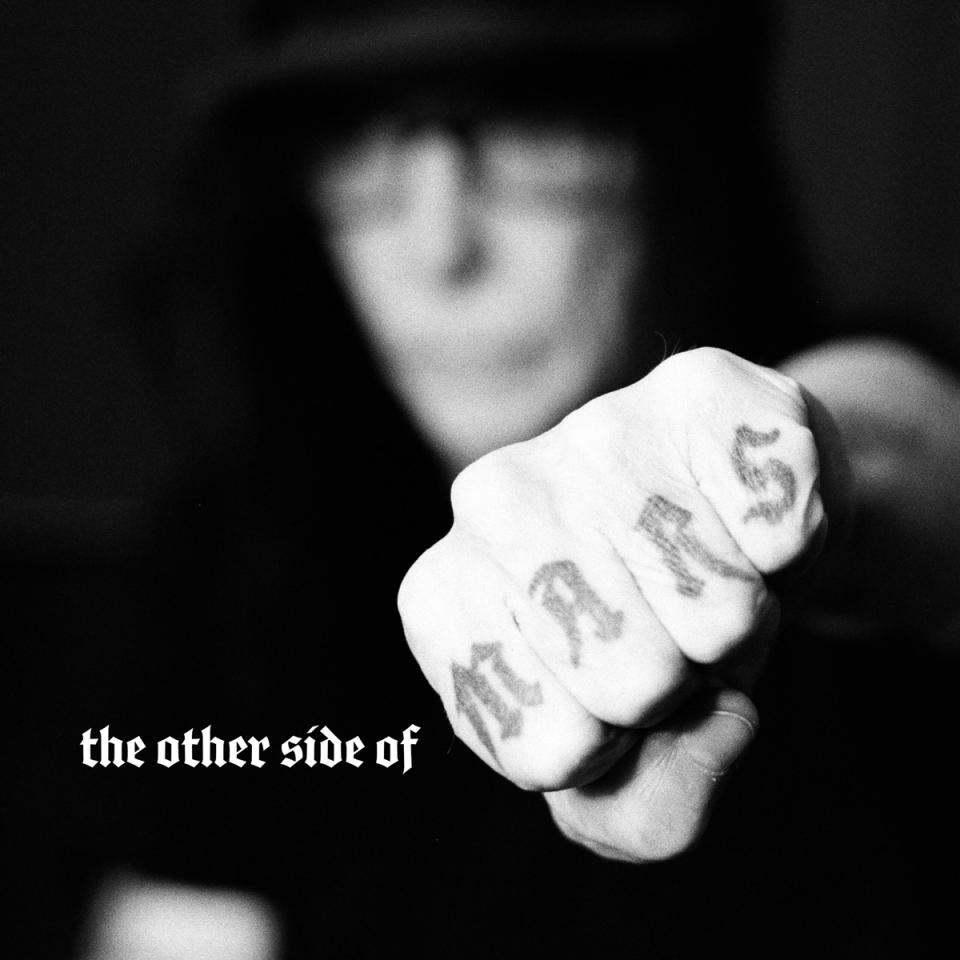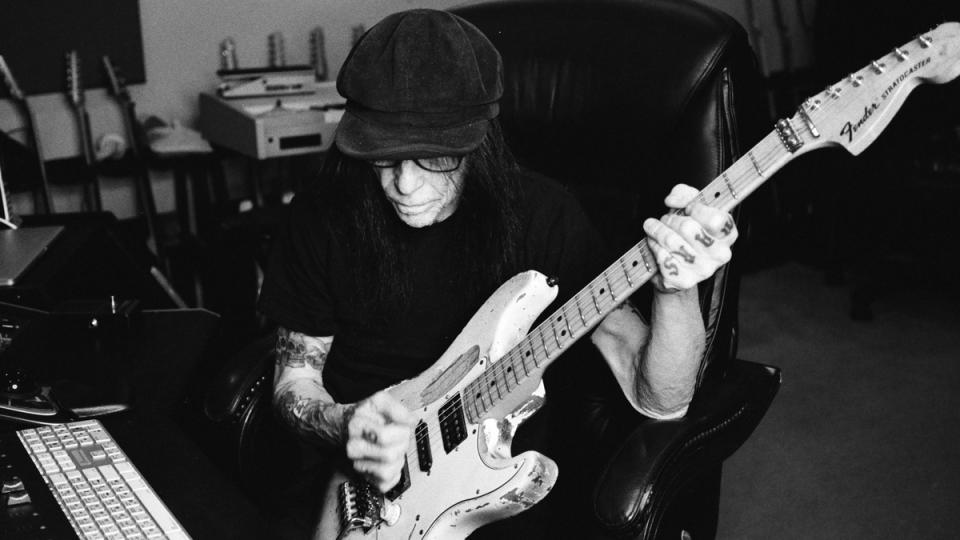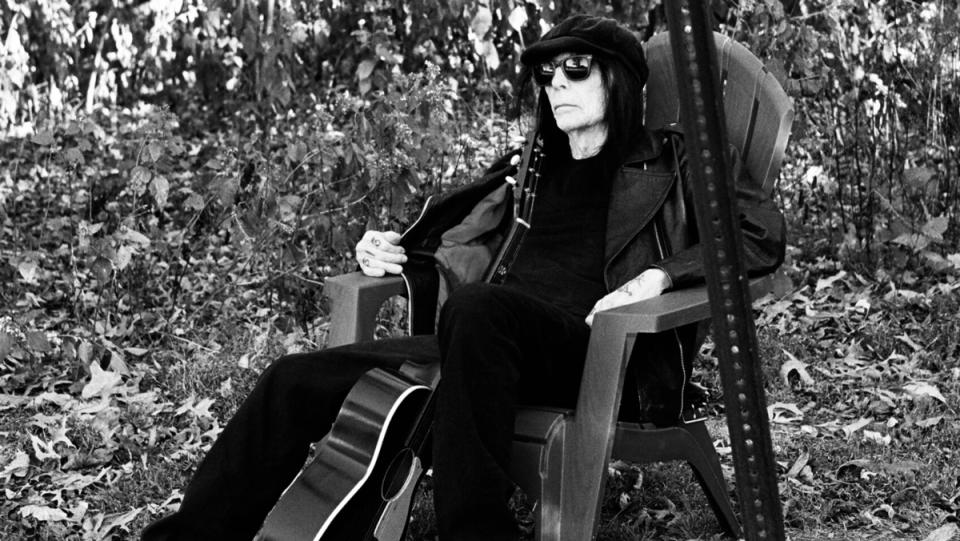“I’ve been wanting to do this solo thing for a very long time. I had to do stuff with Mötley… now it’s my time”: Mick Mars opens up about his surprisingly heavy solo debut and life after the Crüe

- Oops!Something went wrong.Please try again later.
- Oops!Something went wrong.Please try again later.
- Oops!Something went wrong.Please try again later.
- Oops!Something went wrong.Please try again later.
It’s been an eventful year for the man born Robert Alan Deal, best known around the world under the pseudonym Mick Mars. As the co-founding guitarist of Mötley Crüe, his iconic riffs and solos were instrumental in popularizing a new sound for the 1980s, leading to an entire wave of leather-loving glam bands falling under the umbrella ‘hair metal’.
And though it was bassist Nikki Sixx who responsible for penning the lion’s share of their material, Mars did have a hand in co-writing some of the group’s most famous tracks, from the bluesy brilliance of Same Ol' Situation (S.O.S.) to strip club anthem Girls, Girls, Girls and palm-muted juggernaut Dr. Feelgood.
This time last year, it was announced the guitarist would be retiring from touring with the quartet, and the following day it was revealed that John 5 would be leaving Rob Zombie’s band to take his place. No huge surprise there, given the 72 year-old guitarist’s long-standing battle with Ankylosing Spondylitis – a chronic, inflammatory form of arthritis that mainly affects the spine and pelvis – from his late teens onwards, and the newly announced live replacement’s passion for all things Crüe.
Behind the scenes, however, things were starting to unravel and get more and more complicated, resulting in the well-documented and ongoing court case launched by Mars against the band in April of this year.
Accusations have been thrown in both directions – Mars contending that the group were ‘faking’ their live performances while his ex-bandmates and their entourage claim the guitarist is “confused and being misled” and also in the habit of “forgetting chords and songs”. The group have since started working on new music with John 5, for what will be their first-ever recordings without Mars on guitar duties.
There are, however, more positive avenues of discussion when Guitar World connects with Mars just before Halloween. The guitarist is in the process of launching his first solo album, titled The Other Side of Mars, which will feature Ray Luzier from Korn on drums.

In one of his very first interviews about the new music, our conversation naturally begins with one of many questions being asked by fans across the world – what took you so long, Mick?
“There were a lot of stumbling blocks!” laughs Mars, dressed from head-to-toe in black, as he always has.
“I started writing this stuff during The Final Tour [2014-2015] with Mötley Crüe. Then that TV show [The Dirt] came out, so we went back to playing. I had a lot of stuff written at that time but I couldn’t get it finished. Then there was another stumbling block, because I gave the record to a distribution company who didn’t distribute, so I had to get it back and it took me a little while to do that, but it’s okay!
“The first single, Loyal to the Lie, will get premiered on Eddie Trunk’s show [Trunk Nation] because I promised him many years ago. That’s pretty much how it’s going – I’m all about new ideas now! I’ve been wanting to do this solo thing for a very long time. First thing’s first, there are always priorities, I had to do stuff with Mötley… now it’s my time! In fact, I’m already working on my next album. Why stop the momentum, right?!”
So is this a band or a project with a revolving door of members?
“It isn’t really a band. I’ve hired some singers – Jacob Bunton did a lot of stuff, Brion Gamboa is also on the record. He’s so cool… a contractor/construction guy with a voice like that? Come on! Listen to him on the songs Undone and Killing Breed, that’s Brion. Then the other songs are all Jacob.
“They have pretty different voices. Brion had a little more angst for those two particular song. I hired in Paul Taylor [Winger/Alice Cooper/Steve Perry] to do keyboards and also write with me. He knew Brion and brought him in, and the best part is Brion did those songs in just one take, which was unreal! I had to say ‘Please don’t do it again!’ I knew we could correct any off-notes if needed, though there weren’t any. Those first takes made me go, ‘Oh, man!’”
And you have Ray Luzier from Korn on drums, which must be pretty exciting…
I have so many guitars – probably around 50 or 60 different models in my studio – so I try to guess which one will work best for the sound I’m imagining
“He actually insisted on playing on this album! I’m now working on new stuff, not to get ahead of what we’re talking about, and he’s in Bakersfield right now with Korn but he’s coming over tonight and tomorrow he’ll be playing drums on this new song I’ve written. And the other half of the rhythm section is a guy called Chris Collier on bass.”
Broken on the Inside is one of the heaviest riffs we’ve ever heard you play. What’s the story behind it?
“Thank you! I was just goofing around and thought to myself, ‘This could be something!’ It turned out to be pretty thick. Some of these songs were ideas I had rolling around in my mind. I could sense the direction I was going in, on this track as well as other ones like Killing Breed and Undone – which are more about people draining you so much.
“If you listen to the lyrics of Killing Breed, it’s like hearing from someone who has given up on life, feels like they’re stuck somewhere worse than prison and going numb from all the pain after going through too much. It’s about a gang of people or whatever called the Killing Breed, because they are killing this individual by whatever means they can. Not like in terms of murdering or stabbing anyone, but killing him mentally to remove him from life. I guess I was thinking out of the box there.”
Could those be things you can relate to, somehow?
“Yes, mm hmm, yes.”

You went for a really interesting sound for the guitar solo in Loyal to the Lie –there’s this really cutting midrange that seems to leap out of the speakers…
“Yeah! I’ve been playing around with tones – I’m a tone-crazy guy! My wife bought me a Cry Baby [Q Zone Fixed Wah]. It’s a box with knobs on it so you can dial it in exactly how you want it. I found a tone I liked and that’s how it ended up on the track.”
You’ve used all kinds of guitars over the years – from Floyd Rose-loaded Fenders to Les Paul Customs, PRS and Gretsch guitars. What are we hearing on the new recordings?
“I mainly used my Fender – there’s a white one that I’ve played a lot. And there was some Paul Reed Smith. I have so many guitars – probably around 50 or 60 different models in my studio – so I try to guess which one will work best for the sound I’m imagining. Then I’ll pick it up, restring it and I’m ready to go. Obviously, sometimes I will pick one up and realize it doesn’t sound how I need it to, so then I’ll try something else I know I like the tone of.”
So how many guitars do you own in total and which would you say are the most collectible and rare?
I have at least 64 Marshall stacks from different eras, going as far back as the early ’60s
“Overall, I probably own about 120 different guitars… or maybe 121, as I just bought a new bass today. There are some really old ones from as far back as 1948, and I even have one of the first National steel guitars from 1930… the kind of stuff old blues guys like Johnny Winter would play.
“I guess my most expensive guitar is a 1960 Les Paul. That’s probably worth the most. I like the ’68 and ’69 Customs before Gibson got bought out by Norlin and they started sticking those ugly [volute] lumps on the back of the neck. Yuck! Get those away from me. But, who knows, maybe the white Strat I’ve used extensively over the years could fetch more money…”
We’re guessing you have quite a sizable collection of Marshall amps, too. Which models do you like best?
“I have at least 64 Marshall stacks from different eras, going as far back as the early ’60s. I have some of the original cabinets with 20-watt speakers. My collection goes on and on and on. I bought a lot of the 2202s and 2203s, which were pre-JCM models. I guess I’m a bit crazy – I just like equipment, whether it’s old stuff or new stuff. In 40 years’ worth of touring, I’ve bought a lot!”
So which head won the shootout for the new album?
“I’m not sure if you’re familiar with the name [amp-modding legend] Jose Arredondo, but I used one of my Marshalls modded by him. And I also occasionally used a Soldano, depending on what kind of sound I was going for. I’d have an idea in my head and then play around with stuff to get that tone...
“I’m stumbling a bit because people can be a bit like ‘Mick Mars blah blah blah’. I’m not really about playing fast, I’m all about the tone and melodies. I don’t dislike shredders – I think they’re cool because I’m amazed at how they do it – but if you listen to what they play, are people going to leave arenas humming those solos? Probably not. I wanted people to hum my solos, a bit like Jeff Beck. I try to think like him. He would leave you with ideas that would stick in your head.”

Was there much in between your guitar and your amp?
“I used that Cry Baby thing which stays at whatever setting you stick it on. There was also a [DigiTech] Whammy thing. Tom Morello’s really famous for using that one. I used it for a lower octave to make my guitars thicker, tucking those tones in at the back.
“It’s funny – if I took you into my studio and played some parts for you, I guess you might think it sounds like a keyboard or synth. That’s because of the Whammy – when you hit the notes, they can have this strange harmonic [glitch] sound. You can also get it to harmonize a fifth or fourth or whatever, higher or lower, so it sounds odd… but it’s good odd!”
A lot of your solos, from Smokin' in the Boys' Room to Dr. Feelgood, draw heavily from the blues. You’re clearly more interested in what the song calls for than going overboard…
“That’s exactly it. I love the blues, of course. There are elements of that in my playing – it’s the more melodic side of me and I bunch it together with my other influences into one box.”
Too Young to Fall in Love has probably one of your shreddiest solos, with some ambitious single-string alternate picking ideas…
“Even if everybody knows I’m not a shredder, every now and then, it’s okay to stick in a fast idea like that. As long as it fits the song, I’m open to it.”
Dr. Feelgood features some heavy usage of the whammy bar and harmonics. What do you remember about writing it?
“Usually songs like that would start with a strong initial riff that will stick in your head. Girls, Girls, Girls was actually the same way. We were dropping all the strings down to D standard, so they sounded even thicker.
I’d known Eddie Van Halen since he was 19 years old. I’d watch him when I was playing in a band called Whitehorse and saw him grow as a player from there
“There were some tracks that had intros that didn’t feel right. So I would go home and sit with my guitar until I came up with something felt really good. Then I would go back to rehearsal and play it. The guys would all be smiling and looking really happy! That’s basically how I knew it would work.”
You’re part of a generation of guitar players who benefited from the development of the Floyd Rose tremolo system – using it in various riffs and leads and, perhaps most famously of all, for the motorcycle-inspired intro of Kickstart My Heart…
“Yeah, though I never thought about it too much. I just play me, you know? I think it was the same with Edward Van Halen: he was pretty natural. I’d known him since he was 19 years old. I’d watch him when I was playing in a band called Whitehorse and saw him grow as a player from there, using all these crazy hammer-ons.
“When they [Van Halen] came out in 1975, I had a massive smile on my face. He was such a great person. It was incredible to watch him develop. Mötley Crüe didn’t come around until 1981, so we were separated a little bit by time but we’d run into each other once in a while at places like Donington and other European festivals. We’d always hang out a bit and have fun.”
Your work inspired a whole movement of bands – some bad, some great. Which ones impressed you most?
“That’s a hard one! It was a bit like the British Invasion, but this time it was the Los Angeles Invasion. The record companies started signing everybody and anybody. I don’t want to say names of bands, but there were a lot that left me wondering, ‘What is this about?!’ Just like with the British Invasion you had The Beatles, The Rolling Stones and The Kinks and then came all this poppy stuff. In Los Angeles, we started hearing a lot of cheesy things, too!”
Guns N’ Roses were the other ‘big’ 80s/early 90s rock band. Clearly you and Slash are friends – he posted about you using his wah pedal a while back…
I’m proud of everything Mötley Crüe did and everything we achieved together
“Yeah, he was excited about that, going, ‘Woah!’ And I remember thinking his wah was the same color as my boots! He asked if I liked his pedal and I said, ‘Yeah, Slash… it sounds great!’ And yeah, it’s nice that we’re friends. When I look back on those days, we were up to some really exciting stuff. And now I’m me… solo!”
Regardless of how it all seems to be ending, you must still be immensely proud of your many achievements in Mötley Crüe…
“In terms of that body of work, I’m very proud of it. I have all my plaques hanging around. For me, it became too much of a burden for me to tour. I tried to be as up-front as I could with them, saying, ‘I just can’t do this anymore!’ because of my AS [Ankylosing Spondylitis] condition. It stunk, but yeah… I’m proud of everything Mötley Crüe did and everything we achieved together.”
Are you still on speaking terms with John 5?
“Well, I’ve never disliked John, I’ve always liked him and still do. He’s been a really good friend of mine for a long time. So I think they’ve made a very, very wise choice with John.”
The Other Side of Mars is out on February 23 2024, and available to preorder now from MickMarsOfficial.com.
